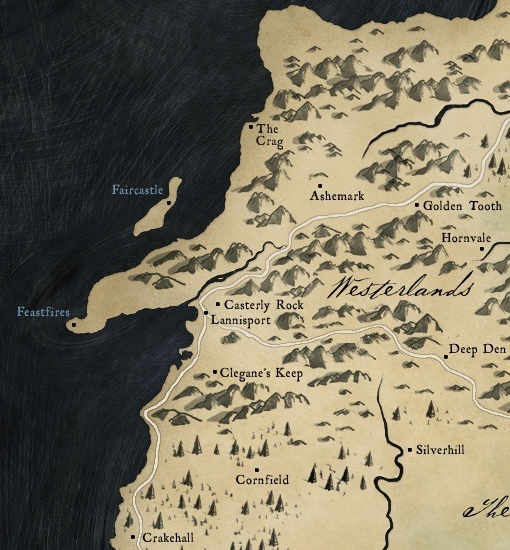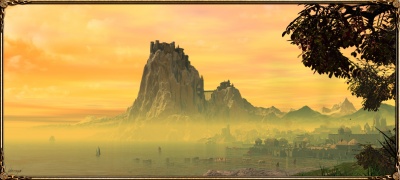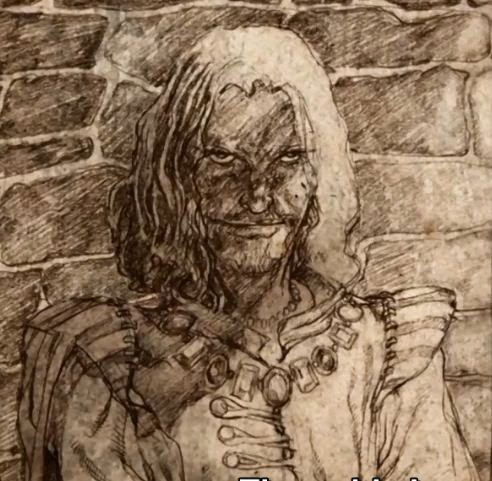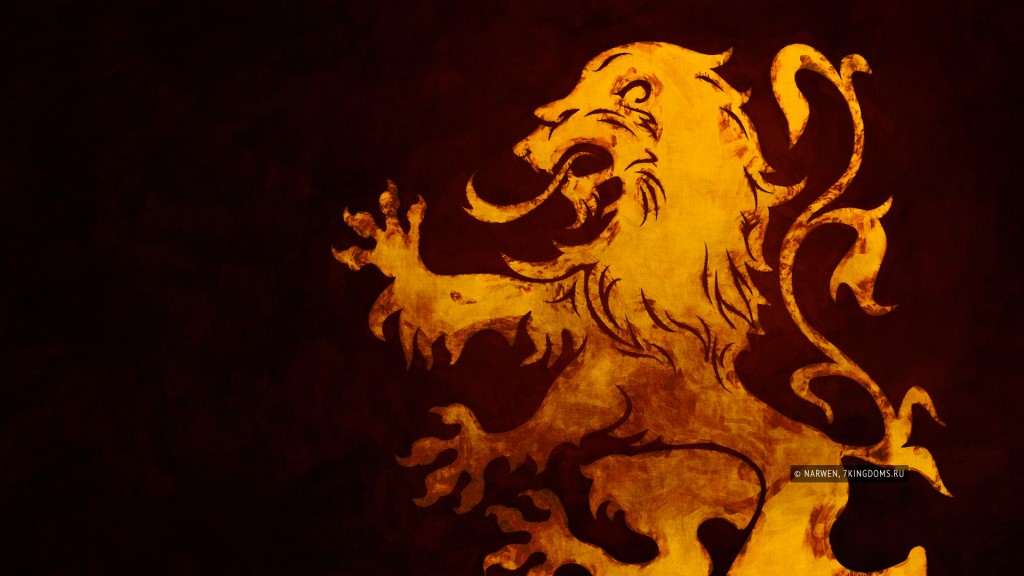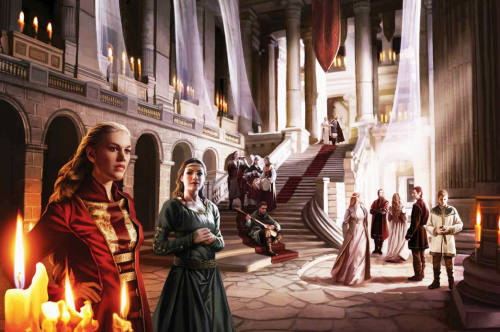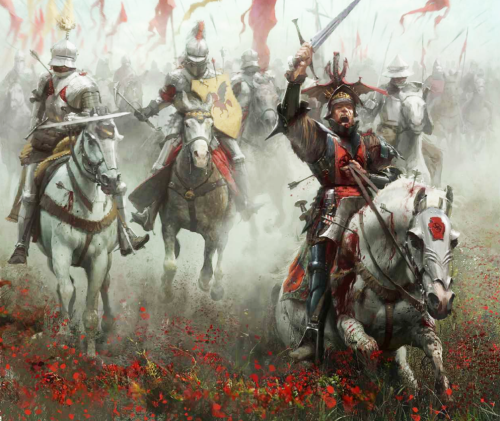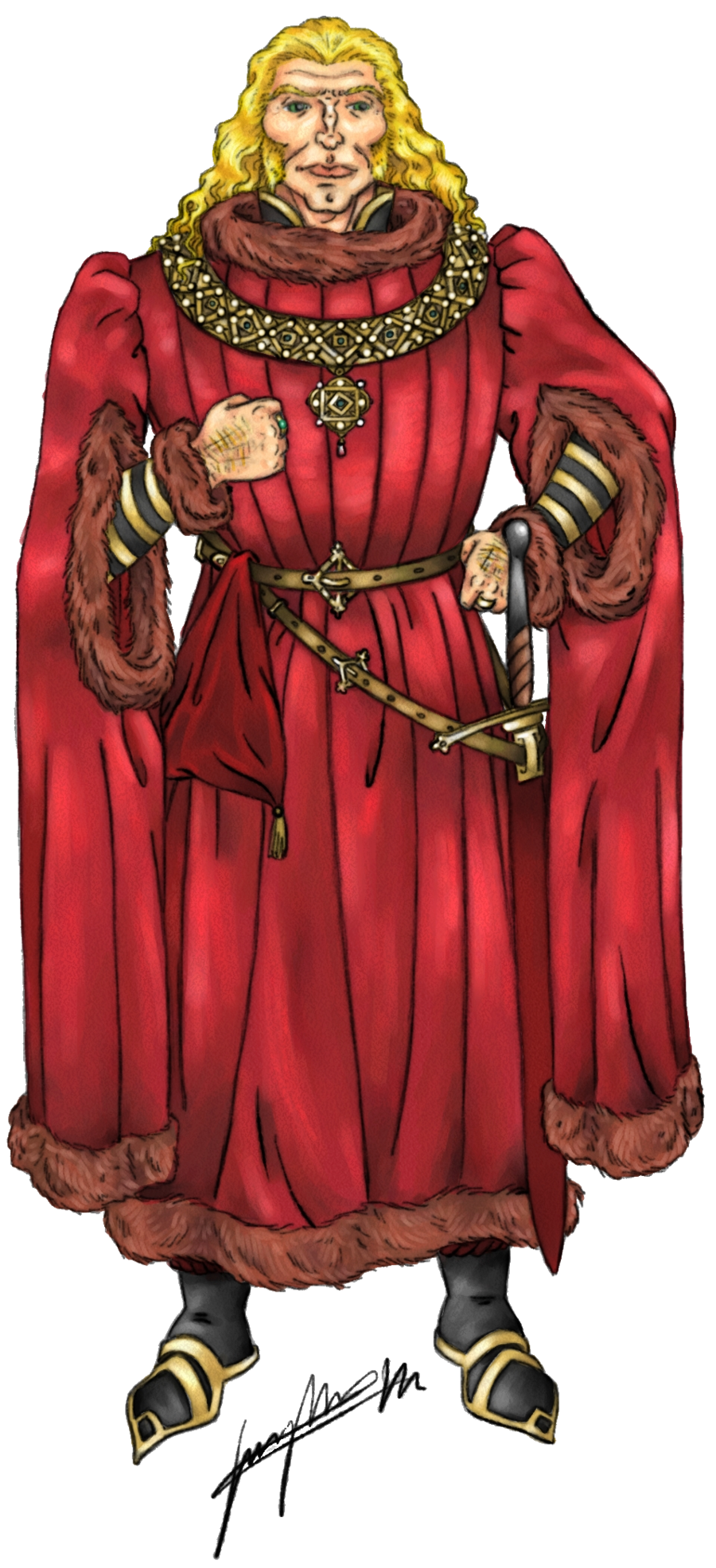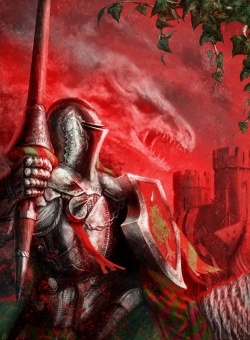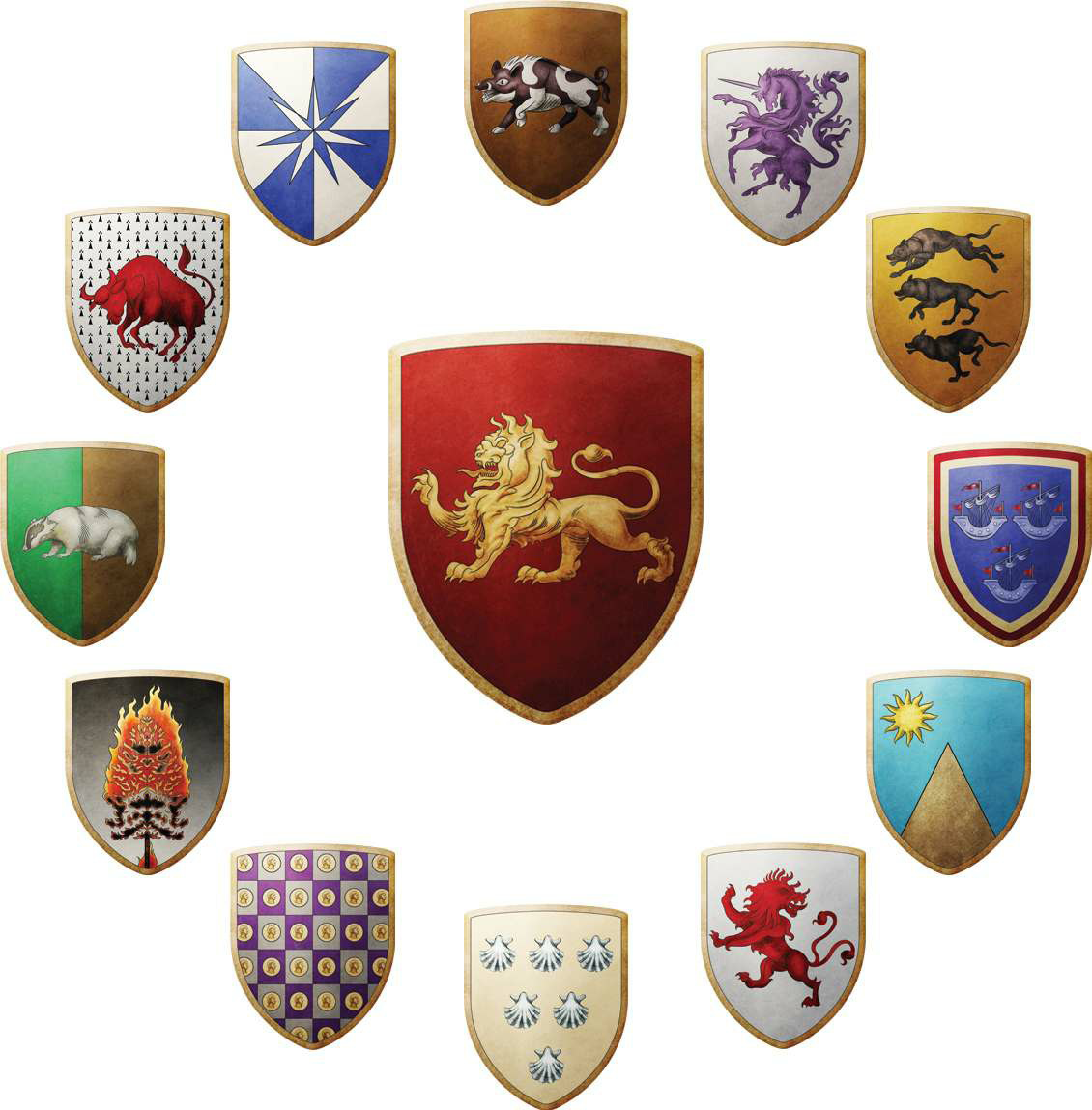The Coming of the Andals
The Andals came late to the westerlands, long after they had taken the Vale and toppled the kingdoms of the First Men in the riverlands. The first Andal warlord to march an army through the hills met a bloody end at the hands of King Tybolt Lannister (called, for a change, the Thunderbolt). The second and third attacks were dealt with likewise, but as more and more Andals began moving west in bands large and small, King Tyrion III and his son Gerold II saw their doom ahead.
Rather than attempt to throw back the invaders, these sage kings found lands for them and arranged marriages for the more powerful of the Andal war chiefs with the daughters of the great houses of the west. Cautious men, and well aware of what had happened in the Vale, they took care to demand a price for this largesse; the sons and daughters of the Andal lords so ennobled were taken as wards and fosterlings, to serve as squires and pages and cupbearers in Casterly Rock. . . and as hostages, should their fathers prove treacherous.
Thus did the Lannister kings turn foes into leal friends. All but a few of the Andal lords kept faith, and when their sons grew to manhood, they became staunch bannermen to the King in the Rock, for they had been raised amongst the Lannisters, and “now their blood runs gold,” as one embittered Andal father said. Many noble houses were born thus, amongst them the Jasts, the Leffords, the Parrens, the Droxes, the Marbrands, the Braxes, the Serretts, the Sarsfields, and the Kyndalls.
In the days of the Hundred Kingdoms, when petty kings ruled over domains that extended no further than a man could see from their castle battlements, and waged endless bloody war upon one another, the westerlands enjoyed centuries of relative peace and prosperity under the Kings of the Rock. Such foes as menaced the west came from without.
The Lannister coastline lies closer to the Iron Islands than any other kingdom, and the wealth of Lannisport and its trade was a constant temptation to the reavers of those benighted isles. Wars between the westermen and the ironborn erupted every generation or so; even during periods of peace the ironmen would come raiding after wealth and salt wives. Fair Isle did help shield the coast further south; for this reason the Farmans became famous for their hatred of the ironborn.
Ultimately the Lannister domains would extend from the western shore to the headwaters of the Red Fork and Tumblestone, marked by the pass beneath the Golden Tooth, and from the southern shore of Ironman’s Bay to the borders of the Reach. The boundaries of the westerlands today follow those of the Kingdom of the Rock as it was before the Field of Fire, when King Loren Lannister (Loren the Last) knelt as a king and rose as a lord. But in bygone days, the boundaries were more fluid, particularly to the south, where the Lannisters oft contended against the Gardeners in the Reach, and to the east, where they warred against the many kings of the Trident.
The gold and silver mines of the westerlands are renowned, for the veins of ore run wide and deep–and there are mines, even now, that have been delved for a thousand years and more and are yet to be emptied. Lomas Longstrider reports that, even in far Asshai-by-the-Shadow, there were merchants who asked him if it were true that the “Lion Lord” lived in a palace of solid gold, and that crofters would collect a wealth of gold by simply plowing their fields. The gold of the west has traveled far, and so far as the maesters know there are no mines in all the world as rich as those of Casterly Rock.
[Sidebar: The wealth of the westerlands was matched, in ancient times, with the hunger of the Freehold of Valyria for precious metals, yet there seems no evidence that the dragonlords ever made contact with the lords of the Rock, Casterly or Lannister. Septon Barth speculated on the matter, referring to a Valyrian text that has since been lost, suggesting that the Freehold’s sorcerers foretold that the gold of Casterly Rock would destroy them. Barth often fell back upon prophecy and legend when attempting to delve into the mysteries of the past, however, and we know now that prophecy is at best ambiguous, and at worst actively false. Archmaester Perestan has put forward a different, more plausible speculation, suggesting that the Valyrians reached as far as Oldtown but suffered some great reverse or tragedy there than caused them to shun all of Westeros thereafter].
House Lannister Under the Dragons
Once Loren the Last gave up his crown, the Lannisters were reduced to lords. Though their vast wealth remained untouched, they did not have close ties to House Targaryen (unlike the Baratheons) and unlike the Tullys they were too proud to scrabble for a place of prominence beneath the Iron Throne.
It was not until a generation later, when Prince Aegon and Princess Rhaena sought refuge from King Maegor the Cruel, that the Lannisters once again began to make a greater mark on the realm. Lord Lyman Lannister protected the prince and princess under his roof, extending guest right and refusing Maegor’s angry demands to yield them up. Yet his lordship would not pledge his swords to the fugitive prince and princess either, nor did he bestir himself until after Prince Aegon had perished at his uncle’s hands during the Battle Beneath the Gods Eye. When Aegon’s youngest brother Prince Jaehaerys put forward his own claim to the Iron Throne, this time the Lannisters rallied to his support.
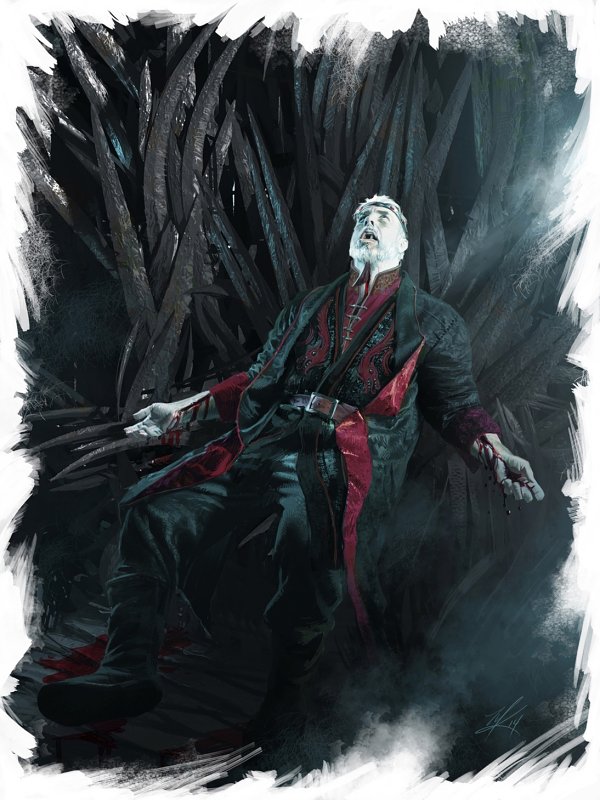
King Maegor’s death and King Jaehaerys’s coronation moved House Lannister closer to the Iron Throne, though the Velaryons, Arryns, Hightowers, Tullys, and Baratheons still eclipsed them in influence. Lord Tymond Lannister was present at the Great Council of 101 AC that decided the succession, famously arriving with a huge retinue of three hundred bannermen, men-at-arms, and servants… only to be outdone by Matthos Tyrell of Highgarden, who counted five hundred in his retinue. The Lannisters chose to side with Prince Viserys in the deliberations, a choice remembered and rewarded some years later, when Viserys ascended the Iron Throne and made Lord Jason Lannister’s twin brother Ser Tyland his master of ships. Later, Ser Tyland became master of coin for King Aegon II, and his close association with the Iron Throne and favored position at court brought his brother Lord Jason into the Dance of the Dragons on Aegon’s side.
The Lannisters’ association with the Iron Throne would prove ill-fated, for the Red Kraken and his reavers fell upon the undefended westerlands whilst Lord Jason marched east at King Aegon II’s behest. Princess Rhaenyra’s supporters met his host at the crossing of the Red Fork, where Lord Jason fell in battle, mortally wounded by the grizzled squire Pate of Longleaf (knighted after the battle, this lowborn warrior would be known as the Lionslayer for the rest of his days). The Lannister host continued to march, winning victories under Ser Adrian Tarbeck, and then under Lord Lefford, only to fall by the thousands at the Fishfeed, caught between three armies.
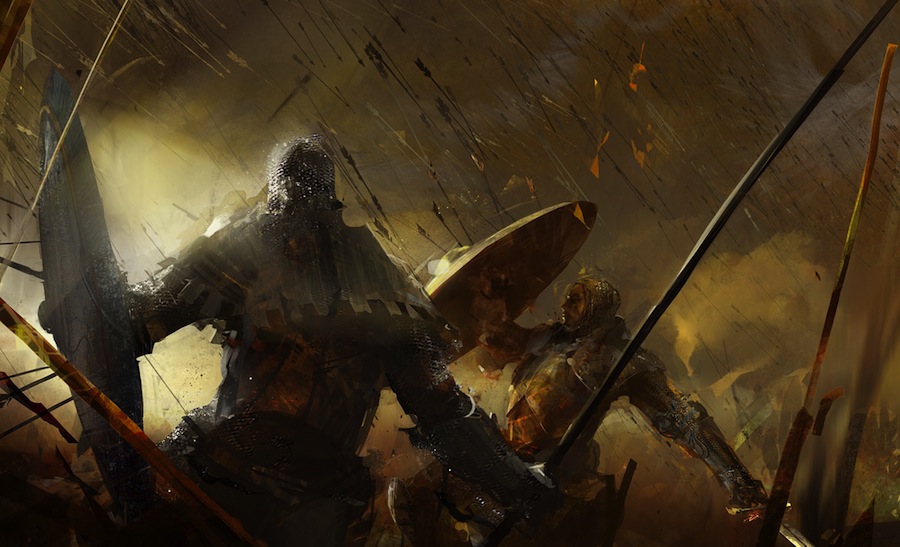
Ser Tyland Lannister, meanwhile, fell prisoner to Princess Rhaenyra after she seized King’s Landing. Cruelly tortured to force him to reveal where he had hidden the crown’s gold, Ser Tyland steadfastly refused to talk. When Aegon II and his loyalists won back the city, Ser Tyland was found to have been blinded, mutilated, and gelded. Yet his wits remained intact, and King Aegon retained him as master of coin. In the last days of his rule, Aegon II even sent Ser Tyland to the Free Cities in search of sellswords to support his cause against Rhaenyra’s son, the future Aegon III, and his supporters.
A regency followed the end of the fighting, since the new king, Aegon III, was but eleven years of age when he ascended the Iron Throne. In hopes of binding up the deep wounds left by the Dance, regents were chosen from both sides of the conflict, and Ser Tyland Lannister was made Hand of the King. Perhaps those who had been his enemies deemed him too blind and broken to be a threat to them, but Ser Tyland served ably for the best part of two years, before dying of the Winter Fever in 133 AC.
Meanwhile, in the westerlands, Lord Jason’s widow the Lady Johanna, acting as regent for her young son, donned man’s mail to drive the Red Kraken from her shores, and later did much to reclaim Lannister glory and win favor with the crown, lending gold for the restoration of King’s Landing.
In the years that followed, the Lannisters stood with the Targaryens against Daemon Blackfyre, though the Black Dragon’s rebels won victories of note in the westerlands — especially at Lannisport and the Golden Tooth, where Ser Quentyn Ball, the hot-tempered knight renowned as Fireball, slew Lord Lefford and sent Lord Damon Lannister (later famed as the Grey Lion) into retreat.
Gerold the Golden
Following the Grey Lion’s passing in 210 AC, his son Tybolt succeeded him as Lord of Casterly Rock, only to perish himself two years later under suspicious circumstances. A young man in his prime, Lord Tybolt left no heir of the body save for a daughter, Cyrelle, three years of age, whose reign as Lady of Casterly Rock proved cruelly short. In less than a year, she too was dead, whereupon the Rock and the westerlands and all the wealth and power of House Lannister then passed to her uncle, Gerold, the late Lord Tybolt’s younger brother.
A genial man, known to be exceedingly clever, Gerold had served as regent for his young niece, but the suddenness of her death at such a tender age set tongues to wagging, and it was whispered widely in the west that Lady Cyrelle had been murdered by her uncle. The most common tale claimed that he had done the deed himself, smothering her with a pillow as she slept.
Gerold Lannister soon proved himself to be an exceptionally shrewd, able, and fair-minded lord, greatly increasing the wealth of House Lannister, the power of Casterly Rock, and the trade at Lannisport. He ruled the westerlands for thirty-one years, earning the sobriquet Gerold the Golden, yet for all his accomplishments, certain of his lords and many of his smallfolk had no love for him, believing him responsible for the murder of his niece (and, some said, his brother Tybolt as well).
No man now living can say with certainly whether there was any truth to these whispers, but the tragedies that befell House Lannister in the years that followed were proof enough for Lord Gerold’s enemies. . . for the kinslayer is accursed in the eyes of gods and men, and the sins of the fathers are oft visited upon the sons.
So it was with Gerold the Golden, who lost both his beloved second wife and his splendid twin sons within the space of a decade. Lady Rohanne vanished under mysterious circumstances in 230 AC, less than a year after giving birth to his lordship’s fourth and youngest son, Jason. Tywald, the eldest of the twins, died in battle in 233 whilst squiring for Lord Robert Reyne of Castamere during the Peake Uprising. Pierced through with a spear as he clambered through the broken gates of Starpike, Tywald died in the arms of his twin brother Tion, who was serving as a squire to Prince Aegon Targaryen, King Maekar’s youngest son. The prince, it is said, fulfilled Tywald’s last request, and dubbed him a knight as he was dying.
King Maekar himself had perished less than an hour earlier, his crowned helm crushed by a rock dropped from the battlements as he led the attack on Starpike’s main gates. Others slain upon that grievous day included Lord Robert Reyne. Ser Roger Reyne (the Red Lion), his eldest son and heir, took a bloody vengeance after the battle, slaying seven captive Peakes before Prince Aegon arrived to halt the slaughter.
The chaos caused by the death of King Maekar I during the Storming of Starpike has been abundantly chronicled elsewhere, so we need not treat of it here. Suffice it to say that the matter of succession was so tangled that the King’s Hand, Lord Brynden (Bloodraven) Rivers summoned a Great Council to settle the issue. The assembled nobles, swayed in no small part by the eloquence (and, some suggest, the gold) of Lord Gerold the Golden, ultimately awarded the Iron Throne to Prince Aegon, who would rule the Seven Kingdoms for the next twenty-six years as King Aegon V (the Unlikely).

Less well known, but no less baleful, are the dire effects the battle would have upon the history of the west. Tywald Lannister had long been betrothed to the Red Lion’s spirited young sister, Lady Ellyn. This strong-willed and hot-tempered maiden, who had for years anticipated one day being the Lady of Casterly Rock, was unwilling to forsake that dream. In the aftermath of her betrothed’s death, she persuaded his twin brother Tion to set aside his own betrothal to a daughter of Lord Rowan of Goldengrove and espouse her instead.
Lord Gerold, it is said, opposed this match, and did what he could to forbid it, but grief and age and illness had left him a pale shadow of his former self, and in the end he gave way, when his son Tion revealed that his brother had pleaded with him to “take care of Lady Ellyn” with his last words. In 235 AC, in a double wedding at Casterly Rock, Ser Tion Lannister took Ellyn Reyne to wife, whilst his meek younger brother Tytos wed Jeyne Marbrand, a daughter of Lord Denys Marbrand of Ashmark.
The Reign of Reyne
Twice a widower, and ailing, Lord Gerold did not wed again, so after her marriage to Ser Tion, Ellyn of House Reyne became the Lady of Casterly Rock in all but name.
As her good-father retreated to his books and his bedchamber, Lady Ellyn held a splendid court, staging a series of magnificent tourneys and balls, and filling the Rock with artists, mummers, musicians… and Reynes. Her brothers Roger and Reynard were ever at her side, and offices, honors, and lands were showered upon them, and upon her uncles,
cousins, and nephews and nieces as well.
Lord Gerold’s aged fool, an acerbic hunchback called Lord Toad, was heard to say, “Lady Ellyn must surely be a sorceress, for she has made it rain inside the Rock all year.” It is a fool’s privilege to make mock of the mighty, even lords and princes. Yet so proud and quick to anger was Ellyn Reyne that when the jape reached her ears, she commanded that Lord Toad be whipped. And so he was, for Lord Gerold was too sick to interfere, and Ser Tion his heir loved his lady with a passion and refused her nought.
In 236 AC, however, the pretender Daemon Blackfyre, Third of His Name, crossed the narrow sea and landed upon Massey’s Hook with Bittersteel and the Golden Company, intent on taking the Iron Throne. King Aegon V summoned leal lords from all across the Seven Kingdoms to oppose him, and the Fourth Blackfyre Rebellion began.
It ended far more quickly than the pretender might have wished, for precious few lords rose to join him; to most, the Blackfyre cause seemed as threadbare and tattered as their banners. The rebellion came to an abrupt and bloody end at the Battle of Wendwater Bridge, when a charge by the king’s knights broke the Golden Company and sent Bittersteel fleeing, and Ser Duncan the Tall of the Kingsguard slew Daemon III Blackfyre.
Afterwards, the corpses of the Black Dragon’s slain choked the Wendwater and sent it overflowing its banks. The royalists lost fewer than a hundred men. . . but amongst the few leal men who fell was Ser Tion Lannister, heir to Casterly Rock.
The loss of the second of his “glorious twins” might well have been expected to break their grieving father, Lord Gerold. Curiously, the opposite seemed to be the case. As Ser Tion’s body was laid to rest within Casterly Rock, Gerold the Golden roused himself, and took firm hold of the westerlands once more, intent on doing all he could to prepare his thirdborn son, the weak-willed and unpromising boy Tytos, to succeed him.
The “Reign of the Reynes” was at an end, Lord Toad the hunchback declared, rejoicing. Lady Ellyn made one final attempt to cling to her place, declaring that she was with child by Ser Tion, but when the moons turned and her belly failed to swell, she was seen to be a liar. Lord Toad, it is said, was merciless in his mockery, to the fury of the Red Lion, who soon departed Casterly Rock for Castamere, accompanied by his brother and many of the other Reynes.
Lady Ellyn remained, but her influence dwindled away to nothing. No longer was she allowed access to the Lannister gold, nor called to council, nor included in decisions and deliberations, and though Lord Gerold permitted her to attend when he held court, she was not allowed to speak. Knights no longer begged tokens of her favor at tourneys, jewelers and dressmakers no longer lavished her with gifts in hopes of her patronage, petitioners no longer came to ask her to intercede for them before the court. And the singers who had once vied with one another to praise her face and form now sang of Lord Tytos’s young wife Jeyne instead, for that solemn, shy, plain-faced child had blossomed into a great beauty.
The rivalry between Ser Tion’s widow and Tytos’s wife now became truly ugly, if the rumors set down by Maester Beldon can be believed. Though Lord Gerold forbade any man to speak of the incident, on the pain of losing his tongue, Beldon tells us that in 239 AC, Ellyn Reyne was accused of bedding Tytos Lannister, whilst urging him to set aside his wife and marry her instead. However, young Tytos (then nineteen) found his brother’s widow so intimidating that he was unable to perform. Humiliated, he ran back to his wife to confess and beg her forgiveness.
Lady Jeyne was willing to pardon her young husband his fumbled infidelity, but was less forgiving of her good-sister, and did not hesitate to inform Lord Gerold of the incident. Furious, his lordship resolved to rid Casterly Rock of Ellyn Reyne for good and all by finding her a new husband. Ravens flew, and a hasty match was made. Within the fortnight, Ellyn Reyne was wed to Walderan Tarbeck, Lord of Tarbeck Hall, the florid fifty-five year old widowed lord of an ancient, honorable, but impoverished House. “A wallowing walrus of a man,” Lord Toad called him. “If bellies were brains, he might have been the wisest man in all the west.”
Ellyn Reyne, now Lady Tarbeck, departed Casterly Rock with her husband, never to return, but the rivalry between her and Lady Jeyne Lannister was not at an end. If anything, it seemed to intensify. ‘The War of the Wombs,’ the hunchback Lord Toad called it. Though Lady Ellyn had not been able to give Ser Tion an heir, she proved more fertile with Walderan Tarbeck (who, it should be noted, had a number of older sons from his first two marriages). In 240 she gave him a daughter, whom she named Rohanne. In 241 another daughter, Cyrelle. Both these names were carefully chosen, Maester Belden points out. “Daggers aimed at Lord Gerold’s heart,” he calls them. In 242 Lady Tarbeck produced a son, a lusty red-haired boy she named Tion.
That same year, however, Lady Jeyne answered with a son of her own. He was given the name Tywin, and legend claims that when his grandsire Lord Gerold ruffled the babe’s golden hair, the child bit his finger.
Other children would follow in good course (three more sons and a daughter), but Tywin, the eldest, was the only grandchild his lordship would ever know. In 244 AC, Gerold the Golden died of a bad bladder, unable to pass water. At the age of four-and-twenty, Tytos Lannister, his eldest surviving son, became Lord of Casterly Rock, Shield of Lannisport, and Warden of the West. All were offices for which he was manifestly unsuited.
The Laughing Lion
Lord Tytos Lannister had many virtues. He was a cheerful man, good-hearted and gentle, a jolly companion at a feast, faithful to his lady wife, indulgent to his children. Slow to anger and quick to forgive, he saw good in every man, great or small, and was too trusting by half. Unlike his brothers, however, he was no warrior. Though a squire as a youth, he was never knighted, and whilst he loved tourneys, it was always as a spectator, never a participant. A plump boy, he became a fat man, for he had a great fondness for cheese, cakes, and beer. The hunchback Lord Toad dubbed him ‘the Laughing Lion,’ for his jovial manner, and for a time the west laughed with him… but soon enough, it became apparent than there were some great lords and noble knights who were laughing at him instead.
Where matters of state were concerned, Lord Tytos proved himself weak-willed and indecisive, swaying back and forth between two courses of action as a reed in the wind. He had no taste for war, and would laugh away insults that would have had most of his forebears shouting for their swords. “Words are wind,” he would say, even when mocked to his face (for, indeed, he had been made the subject of mockery since he was a boy). He would shrug off betrayals as misunderstandings, and forgive any trespass if asked for pardon.
“My lord father would have made a splendid innkeep,” observed Gerion Lannister, the youngest of Lord Tytos’s four sons, years later, “but old Toad would have been a better lord.”
He was not wrong. House Lannister reached its nadir during the years that the Laughing Lion held court at Casterly Rock.
The lords of the westerlands had known Tytos Lannister since birth. A few did their best to support him, offering him sage counsel, and their swords when needed. The chief amongst these was Lord Denys Marbrand, Lady Jeyne’s father, who became a pillar of strength for his daughter and her lord husband.
Others saw in his weakness an opportunity to grasp power, wealth, and land for themselves. Some borrowed heavily from Casterly Rock, then failed to repay the loans. When it was seen that Lord Tytos was willing to extend such debts, even forgive them, common merchants from Lannisport and Kayce began to beg for loans as well. Lord Tytos’s edicts were widely ignored, whenever his lords found fault with them. . . as they did whenever those edicts interfered with their own rights and powers. Corruption became widespread, as offices and honors were bought and sold, and taxes and duties and levies due to Casterly Rock increasingly went astray. Pirates from the Stepstones appeared in the waters offshore to prey upon merchantmen coming and going from Lannisport, and reavers from the Iron Islands harried the coast, carrying off wealth and women. Lord Tytos had no answer, but to dispatch ravens to Lord Quellon Greyjoy on Pyke, demanding that the ironmen desist.
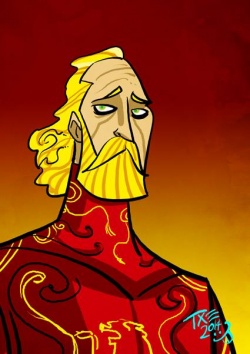
At feasts and balls, guests felt free to make mock of his lordship, even to his face. “Twisting the lion’s tail,” this was called, and young knights and even squires vied with one another to see who could twist the lion’s tail the hardest. No one laughed louder at these japes than Lord Tytos himself. “It was only a bit of fun,” he would tell his lady wife when she bristled at some insult. “He’s a good fellow now, I am sure that he meant nothing by it.”
Maester Belden, in one of his letters to the Citadel, wrote, “His lordship wants only to be loved. So he laughs, and takes no offense, and forgives, and bestows honors and offices and lavish gifts on those who mock him and defy him, thinking thereby to win their loyalty. Yet the more he laughs and gives, the more they despise him.”
The maester was not the only man in Casterly Rock to see what was happening. His lordship’s wife, the Lady Jeyne, could see it too, as could her father. Time and again they urged Lord Tytos to be firm, and he would swear to do so. . . only to retreat, forgive, or procrastinate once more. When asked for pardon, he would grant such, no matter the crime. When threatened, he would yield, or offer some feeble compromise.
The growing disrespect shown to House Lannister soon became a constant source of conflict between Lord Tytos and his brother Jason, nine years the younger. A fierce child, he grew into a prideful, quarrelsome youth with a fiery temper. Though often openly scornful of his elder brother himself, he was quick to take umbrage when others disparaged Lord Tytos. At fourteen, he got a serving girl at Casterly Rock with child, and sired his first bastard. At fifteen, he deflowered Lord Stackspear’s maiden daughter, getting her with child as well. Lord Tytos, in a rare display of firmness, insisted that his brother marry the girl (most believe this was done at the behest of his wife, the Lady Jeyne) only to have the poor girl die in childbirth. Anxious to avoid further scandals and further bastards, his lordship and Lady Jeyne allowed Jason only a fortnight to mourn, then compelled him to wed again, this time to Lord Prester’s daughter Marla. Though twice the age of her new lord husband, she would give him three trueborn daughters and two trueborn sons in the years that followed. And even Maester Belden confessed himself relieved when Jason Lannister departed the Rock to live with his lady wife at Feastfires.
As the power of House Lannister waned, other Houses grew stronger, more defiant, and more disorderly. Lord Farman of Fair Isle began to build a fleet of warships to defend his coasts against the ironmen, in defiance of Lord Tytos, who did not wish to give offense to the Greyjoys of Pyke. Three landed knights and a petty lord whose lands lay near the border between the westerlands and the Reach swore fealty to House Tyrell, declaring that Highgarden offered them more protection than Casterly Rock. Lords Jast and Falwell, embroiled in a private quarrel, decided to settle the matter with a melee rather than seek a ruling from the Lion’s Mouth. Nine men were killed, twenty-seven maimed and wounded, and still the quarrel raged on. Lord Stackspear doubled the taxes on his smallfolk, though Lord Tytos forbade it, then hired a company of Volantene sellswords to enforce his onerous exactions.
By 254 AC, even lords beyond the borders of the westerlands had grown aware that the lion of Casterly Rock was no longer a beast to be feared. Late that year, Lord Tytos agreed to wed his seven-year-old daughter, Genna, to a younger son of Walder Frey, Lord of the Crossing. “He seems a good fellow,” his lordship said feebly, when his weeping wife demanded to know why he would marry their only daughter into a House far below the Lannisters in power and prestige, “and he asked courteously.” Even when his eldest son denounced the betrothal in scathing terms, Lord Tytos would not relent, insisting that he could not break his word, though several of those present swear he flushed in shame. Tywin Lannister was but twelve years of age, yet even then men could see that this iron-willed, fearless child was hard beyond his years, and nothing like his father.
Not long after, it was whispered about Casterly Rock that the lad and his father been heard shouting at each other in Lord Tytos’s solar. Some swore that Tywin had even struck his sire, though the truth of that was never proved. But within the fortnight, Lord Tytos dispatched his heir to King’s Landing, to serve as a cupbearer at King Aegon’s court. His lordship’s second son, Kevan, was sent away as well, to serve as page and later squire to the Lord of Castamere.
Old, rich, and powerful, the Reynes had prospered greatly from Lord Tytos’s misrule. Roger Reyne, the Red Lion, was widely feared for his skill at arms; many considered him the deadliest sword in the westerlands. His brother, Ser Reynard, was as charming and cunning as Ser Roger was swift and strong.
And as the Reynes rose, so too did their close allies, the Tarbecks of Tarbeck Hall. After centuries of slow decline, this poor but ancient House had begun to flourish, thanks in large part to the new Lady Tarbeck, the former Ellyn Reyne, who had so briefly been the Lady of Casterly Rock in all but name.
Though she herself remained unwelcome at the Rock, Lady Ellyn had contrived to extract large sums of gold from House Lannister through her brothers, for Lord Tytos found it very hard to refuse the Red Lion. Those funds she had used to restore the crumbling ruin that was Tarbeck Hall, rebuilding its curtain wall, strengthening its towers, and furnishing its keep in splendor to rival any castle in the west. At her urging, Lord Tarbeck expanded his domain by buying the lands of the lesser lords and landed knights about him. . . and taking by force the holdings of those who refused to sell.
Some of those thus dispossessed went to Casterly Rock for justice, but Lord Tytos shrugged off their complaints, or else refused to see them. Meanwhile, Lord and Lady Tarbeck built roads and septs and holdfasts, and brought ever more knights, archers, and men-at-arms into their service. Walderan Tarbeck had supported twenty household knights before his marriage to Ellyn Reyne; by 255 AC, that number had swollen to five hundred. Closely bound by bonds of blood and marriage, the Reynes of Castamere and the Tarbecks of Tarbeck Hall would soon constitute the most serious threat to Lannister rule in the west since Lann the Clever has winkled the Casterlys out of Casterly Rock.
In 255 AC, Lord Tytos celebrated the birth of his fourth son at Casterly Rock, but his joy soon turned to sorrow. His beloved wife, the Lady Jeyne, never recovered from her labor, and died within a moon’s turn of Gerion Lannister’s birth. Her loss was a shattering blow to his lordship. From that day forth, no one would ever again call him the Laughing Lion.
And more grief awaited him, for three landed knights who had lost their lands to Lord and Lady Tarbeck had made their way to King’s Landing, to lay their grievance before King Aegon V. His Grace grew most wroth, it is written, and sent word to Casterly Rock, commanding Lord Tytos to deal with this matter forthwith, “lest we be forced to deal with ourselves.”
Spurred by the royal command, his lordship sent his grieving good-father, Lord Denys Marbrand, to ride in strength to Tarbeck Hall and deliver Lord and Lady Tarbeck to Casterly Rock, that they might be made to answer for their crimes. “Sweet words,” that old warrior is reported to have said upon hearing the command, “and long have I yearned to hear your lordship speak them.”
The outcome was less sweet. The Tarbecks had friends even within Casterly Rock, and knew of Lord Marbrand’s coming even before he set out. Lord Tytos had commanded his good-father sternly not to involve the Reynes “for we have no quarrel with Castamere,” but that did not stop Lady Tarbeck from sending to her brothers. Denys Marbrand and his knights were still two days ride from Tarbeck Hall when the Red Lion fell upon his camp in the night, slaying hundreds, amongst them old Marbrand himself. When word reached Casterly Rock, loud cries went out for war, and Maester Belden tells us that Lord Tytos “turned as purple as a plum, and could not speak for his wroth.”
Yet even before the banners could be called, Ser Reynard Reyne appeared at court with his easy smile and sly tongue, to make obesience before the Lion’s Mouth. Lord Marbrand’s death had been a “tragic misunderstanding,” Ser Reynard said; his brother had believed he was attacking a band of outlaws and robber knights. He offered sincere apologies and a blood price to House Marbrand… whereupon Tytos Lannister pardoned the Red Lion and the men who rode with him, and for good measure, absolved Lord and Lady Tarbeck as well, “for Lord Walderan has written us, foreswearing his past wrongdoing, and declaring that henceforth he shall be our most leal bannerman and servant.”
(Archmaester Perestan has suggested that Lord Tytos may have pardoned Lord Reyne and his men because his own son Kevan was amongst them. It may be so; we know for a certainly that Kevan Lannister was in service at Castamere at the time).
Red Lion and Gold
 У неё, между прочим, собственная вооружённая сила и поддержка населения была.
У неё, между прочим, собственная вооружённая сила и поддержка населения была.

 Емнип, Ран сказал, что дракон Рейны был здоровым. Следовательно, он не был ни чахлой зеленой самкой, ни одним из тех двух с уродливыми черепами размером с череп мастифа.
Емнип, Ран сказал, что дракон Рейны был здоровым. Следовательно, он не был ни чахлой зеленой самкой, ни одним из тех двух с уродливыми черепами размером с череп мастифа.
 Если уж они могли спокойно королев из окон выбрасывать, то и дракона отравить - вопрос техники.
Если уж они могли спокойно королев из окон выбрасывать, то и дракона отравить - вопрос техники.